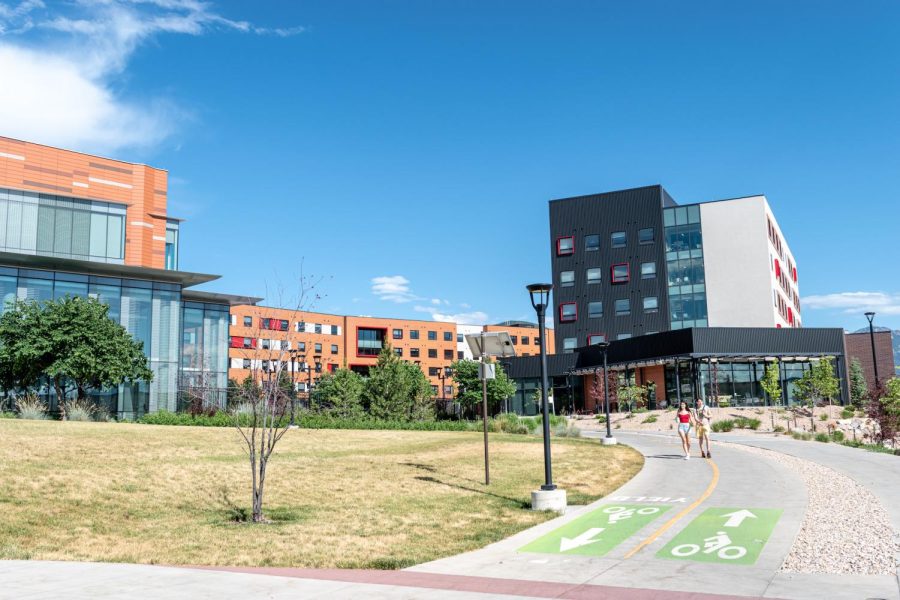In response to increased enrollment and housing demand, the University of Utah will provide guaranteed on-campus housing for first-year students starting in Fall 2024.
“I’m just very excited about [it] and I certainly understand the pain that we’ve had in the past regarding just housing limitations,” said Sean Grube, executive director of Housing and Residential Education. “But I think we’ll be able to really address those in the future and build a very vibrant campus community.”
This initiative is a part of U President Taylor Randall’s vision of the university moving away from being a commuter college. In January 2023, the U set a goal of adding 5,000 new student beds by 2030, which would double on-campus housing.
“We are at the beginning stages of transforming the U campus into a college town,” said U President Taylor Randall in an @TheU article. “Housing is a critical component of this transformation and by guaranteeing first-year students a place to belong, they will be more successful academically and socially and help us toward our goal of revolutionizing the student experience.”
Grube said the U wants to provide more housing, particularly for first-year students, because of the “decades worth of research” that shows living on campus leads to increased retention and graduation rates.
Based on data recently run through institutional analysts at the U, a “first-year student who lives on campus for their first year is 20 percentage points more likely to graduate than a student who doesn’t,” added Grube.
The Housing Application for the 2024-25 school year will open on Wednesday, Jan. 17, 2024. Grube said it’s important that students apply by their priority deadline of May 3, 2024.
“After that, we will continue to do our best to house students, but we can no longer guarantee [housing] after that time,” Grube said.
Grube added that this initiative “is not a guarantee of a specific room type or a specific location.”
Why Now?
Increased enrollment at the U in recent years is driving the need for more housing. The U set first-year class size records each of the past four years. It looks set to another enrollment record this fall, but enrollment numbers have not been released yet.
Grube explained that one of the reasons the U is now able to guarantee housing to all first-year students is that they no longer allow first-year students to apply for housing until they pay their enrollment deposit for the U, which is something they started in the 2023-24 application cycle.
“The reason that’s important is it really just makes people commit in some way to the institution before they apply to housing,” Grube said.
This is a big change from 2022, when there was an “enormous waitlist” for housing, which could include lots of people who weren’t fully committed to attending the U, said Grube.
Another reason the U is able to implement this initiative is because of new housing like the fourth wing of Kahlert Village, which added over 400 first-year beds.
Additionally, the Impact & Prosperity Epicenter — the newest housing project at the U, located on lower campus near the Student Life Center, Student Union and Lassonde Studios — is scheduled to open in Fall 2024. It will house 778 residents with three different housing options, including 4- or 8-bedroom apartments, cluster-style single and double rooms, and end-cap communities.
“About 50% of those [778] beds are for first-year students and 50% are for upper-division students,” Grube said. “So with those additional beds, plus the process change, we feel very confident that we’ll be able to offer housing based on admissions projections.”
What do Students Think?
First-year biomedical engineering major Jacob Thueson said he thinks it’s important to guarantee housing for freshmen.
“Especially if people are coming from either out of states or internationally, having a guaranteed place to live is definitely something that is beneficial to people,” Thueson said.
Thueson, who lives on campus, said doing so makes it a lot easier for him to connect with fellow students.
“If you’re commuting every day, then it’s just harder to actually get in touch with people, especially outside of class time,” Thueson said. “I also think it just makes it easier to study because you can find groups and locations easier on campus, as well as getting involved more in clubs or other groups.”
Quincy Noel Sorensen, third-year majoring in biology and gender studies, said she thinks it’s great that the U has this initiative for next year, but “wishes there would be some [more] focus on the quality of housing and the welfare of students.”
Sorenson explained Sage Point — the housing that she lived in during her freshman year — is, in her experience, “consistently run down, there are plumbing issues, there are bug infestations, the quality there is just severely diminished.”
“It doesn’t matter if you have lots of housing if it’s kind of a miserable experience,” Sorenson said.
Tomas Cruz, third-year political science and Spanish major, said the initiative is probably a good first step, but he’s still worried about housing being affordable for everyone.
“We’re still behind in terms of trying to make [housing] more affordable and more accessible … not just for first-year students, but also just for the general student population,” Cruz said.
Cruz added he thinks it’s important for the U to still acknowledge that many students live off-campus and try to make it more affordable to live close to campus by doing something like investing in subsidized housing for students near the U.
Applying for Housing
Once prospective first-year U students have paid their enrollment deposit fee, they can apply for housing through their CIS account. Students need their student ID number and credit card information to complete the application.
Applicants have to pay a $130 one-time, non-refundable application fee in the Housing U portal. Then, students pay a $200 reservation fee to secure a space. The reservation fee is counted toward the total cost of the room and must be paid within three business days of selecting a room.
The deadline to apply for First Year Living Learning Community is Wednesday, March 20, 2024, and Friday, May 3, 2024 is the deadline for traditional housing. U Housing costs vary by community and room type.




